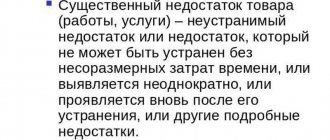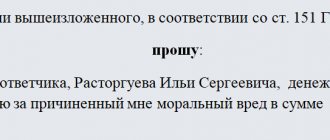Concept
Constitutional law does not allow humiliation of the honor and dignity of an individual, and insult is precisely a violation of human rights, which is expressed in an unacceptable form.
“Honor” is the attitude towards a human person in society, in other words, his reputation. “Dignity” is a person’s attitude towards himself, his inner beliefs, ideology and principles.
Thus, an insult is an undermining of social security, leading to a loss of respect from others. There are a number of specific factors that clarify what exactly can be interpreted as an insult:
- Obscene language, prohibited language addressed to a specific person.
- An offensive comparison, for example, with representatives of the animal world.
- Touching a person without their consent, which can be interpreted as mocking or cynical.
- Offensive body movements.
- Forced undressing and so on.
Insulting an employee can be expressed not only verbally, but also in writing, as well as through action.
Such an insult in the workplace especially affects the dignity of the individual, as it occurs in front of co-workers and can create uncomfortable working conditions.
What is the article?
The law of the Russian Federation gives space to the issue of insult in several legislative acts.
Criminal Code (Criminal Code of the Russian Federation)
Until 2013, the Criminal Code of the Russian Federation had Article 130, which defined punishment for humiliation of a person’s honor and dignity . But, later it was canceled, replacing it with Article 5.61 of the Code of Administrative Offences. Despite this, liability exists for those who insult an official or military personnel only if such an act is related to the performance of work duties or at the time of performance thereof.
In the Criminal Code of the Russian Federation there are two more norms related to the concept of “insult” . This is slander and a threat to life and health. The first is the dissemination of defamatory information that is not true. Information that is not offensive in nature can be slander; however, the opposite can also occur.
Threatening death or causing serious bodily harm is not an insult, but aggressive behavior may combine the two. Criminal liability under this article occurs only in the case of a real threat, and is also confirmed, for example, by preparation for an attack.
Civil Code (Civil Code of the Russian Federation)
Art. 152 of the Civil Code of the Russian Federation indicates that a citizen may demand a refutation of disseminated information discrediting his dignity. This occurs in civil proceedings, however, the defendant can avoid sanctions by proving that the information provided is true.
Code of Administrative Offenses (CAO)
The most frequently used article for insulting an employee by an employee in the workplace is Art. 5.61 of the Code of Administrative Offenses, entails the imposition of administrative liability for insult in a public place expressed in an indecent form or failure to take measures to prevent actions that offend dignity
Liability for insult under the Criminal Code
Previously, the Criminal Code had Article 130, which provided for the punishment of the perpetrator for libel, including imprisonment for up to 2 years. After amendments to the code, humiliation of a person’s honor and dignity can be considered a criminal offense only in two situations:
- insult to a military man;
- insult to a government official.
Article 319 of the Criminal Code of the Russian Federation provides for punishment for a person who humiliated the honor and dignity of an official of a government body when he was directly performing his duties, in the form of:
- a fine in the amount of not more than 40,000 rubles;
- a fine in the amount of three monthly salaries or other income received by the perpetrator;
- corrective labor for a period not exceeding three hundred and sixty hours;
- corrective labor for a period not exceeding one year.
It is worth noting: another type of insult that provides for criminal liability is insult to religious feelings. These are actions that publicly demonstrate disrespect for the religious beliefs of others. Such an offense is prosecuted under Article 148 of the Criminal Code of the Russian Federation. More information about insulting the feelings of believers can be found here.
Art. 336 of the Criminal Code of the Russian Federation provides for punishment for a convicted person who humiliated the honor and dignity of a military man:
- insult by one military man to another is punishable by restriction in service or placement in a special disciplinary military unit for a period of up to six months;
- Insulting a serviceman by a superior or a subordinate is punishable by restriction in service or placement in a disciplinary military unit for up to twelve months of the year.
What to do if you are insulted at work?

When faced with rudeness in the workplace, you should not gloss over this fact.
The offender may not limit himself to a one-time manifestation of his emotions, so you should take care to protect your interests .
If you do not want to get involved in litigation or contact the police, you should write a memo to your boss. In this document, indicate the circumstances of the incident. It’s also good if your colleagues can confirm this. In this case, the employer can take action and impose a disciplinary sanction on the offender, for example, in the form of a reprimand.
Report for personal insult in the workplace
If you decide to punish the offender to the fullest extent of the law, then there are two options - contact the police with a statement or go to court with a claim.
You can use these two ways at the same time. The police will investigate this fact and, if they establish the validity of such an offense, will impose a fine. And in court you can recover compensation for moral damage.
How to compose it correctly?
To correctly draw up a statement of claim , it is best to seek help from a professional lawyer . However, you can do this yourself. In the application you must indicate your data: full name, address, passport details, address of place of work. Specify in detail the circumstances of the incident, name the witnesses and file a petition to bring them to court. This is done to prove that you are right and confirm that the insult occurred.
The application must indicate the details of the offender. If the insult was inflicted in writing, and also if there are other supporting materials, such as a video or audio recording, this should also be attached to the claim.
Where to send?
The statement of claim 
If you submitted an application to the Ministry of Internal Affairs, please attach the issued certificate. The court may call witnesses to confirm the insult.
Now anything can be considered an insult
The bill on punishment for insulting citizens, when considered in the first reading in the State Duma, received the support of all factions except the Communist Party of the Russian Federation. At the instigation of the authors, United Russia members Andrei Turchak and Alexander Khinshtein, the corresponding changes to the Administrative Code began to be loudly called “a bill against boorish officials.” Although this is not entirely true.
The new norms of the Code of Administrative Offenses actually make it possible to fine officials who make “offensive statements” against citizens. The maximum fine for such an offense will be 150 thousand rubles or a penalty of disqualification for up to two years may be applied.
But, most importantly, the very concept of “insult”, enshrined in Part 1 of Article 5.61 of the Code of Administrative Offenses, is expanding. Now it will be considered that such an act can humiliate the honor and dignity of both one person and a group of people, and can also be expressed not only, as now, in an indecent, that is, obscene manner, but also “in another humiliating manner that offends public morality.” form." At the same time, the maximum fines for insult are increased: for citizens up to 10 thousand rubles, officials - up to 100 thousand rubles, and legal entities - up to 700 thousand rubles. At the same time, they will now punish for insults committed not only in the media, but also on the Internet, that is, on blogs and social networks.
41437 Feeling of approaching “movement”
When discussing the bill in the State Duma, deputies focused on the fact that officials will now have to carefully “filter” their words and not become like the authors of scandalous statements about “pasta” and “the state did not ask you to give birth.” “The law will help put an end to the rudeness of officials... Now it is not possible to punish negligent government officials, this causes a fierce reaction from society,” Khinshtein noted, presenting the project to his colleagues.
Taking into account the fact that deputies adopted a scandalous law on insulting the authorities last year, the new norms were presented almost as “mirror measures.” They say that now not only citizens who scold the authorities will be punished, but the officials themselves who openly despise the people.
However, none of the parliamentarians even dared to suggest out loud that in practice the new law would not be used against boorish officials, but rather to pacify citizens who criticize the authorities. The risks of receiving a fine for any statement were actually pointed out to deputies in the government, the legal department of the State Duma, as well as the relevant Duma Committee on State Construction and Legislation.
Thus, deputy Viktor Pinsky, outlining the committee’s position on the bill, drew attention to the fact that in Russian legislation there is no concept of “other humiliating forms” of insults. “To exclude the possibility of a broad interpretation, it is necessary to provide a closed list of forms of insults,” Pinsky said, adding that the committee is already working on this.
60399
If we reset Putin, will we also reset Russia?
The government also pointed out the uncertainty, evaluative nature and even redundancy of new additional signs of insult. They also noted that only state civil and municipal employees will be punished, while the new rules will not apply to “other officials performing publicly significant functions.”
Parliamentarians themselves cannot say exactly which statements will be considered offensive. In this regard, LDPR deputy Alexander Starovoytov noted that citizens perceive many laws adopted by the State Duma as an insult. And United Russia member Dmitry Skrivanov said that people take it as an insult that when they turn to a high-ranking official with a request to solve a problem, they receive an answer from an official of lower status.
In the courts, everything will depend on the results of the linguistic examination, and the new law does not provide guarantees against pocket specialists. So, if they wish, officials can always avoid punishment. The danger of the adopted norms is that almost anything can now be considered an insult. After all, if the law is written in “another form,” then it means anything at all—it can be not only words, but also a caricature and even an anecdote. In other words, the authorities will be able to selectively punish people and this will not promote freedom of speech. Moreover, the officials themselves will also decide that in this situation it is better to communicate with citizens and the media exclusively in writing or through press secretaries.
Elena Zemskova
Punishment for insult and threat of physical harm at work
A proven fact of personal insult in the workplace will ensure that the offender is punished. The law also contains qualifying elements of a crime that aggravate the guilt and increase the punishment.
| 1 | Verbal abuse | Fine in the amount of 1,000 to 50,000 rubles, arrest or imprisonment for 15 days |
| 2 | Insult combined with an action (hitting, forcing to perform a certain action, etc.) | Compensation for moral damage (up to 50,000 rubles), imprisonment for up to 1 year |
| 3 | Insult leading to victim's suicide | Imprisonment from 3 to 7 years |
Insult at work – this is an extremely unfortunate incident, especially if you want to command the respect of your colleagues. Therefore, the offender should not be left unpunished. Moreover, the legislation stands on the side of the victim and protects him from arbitrariness.










